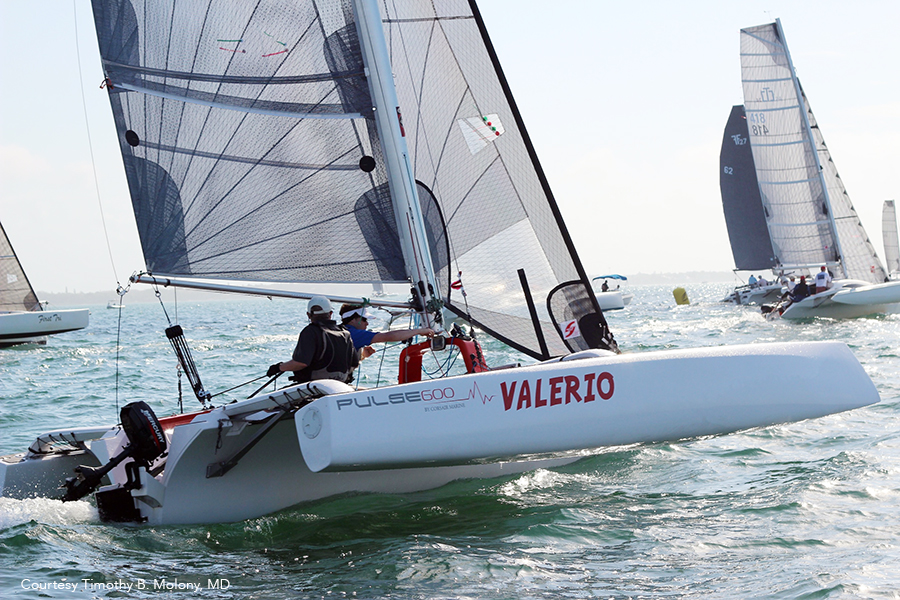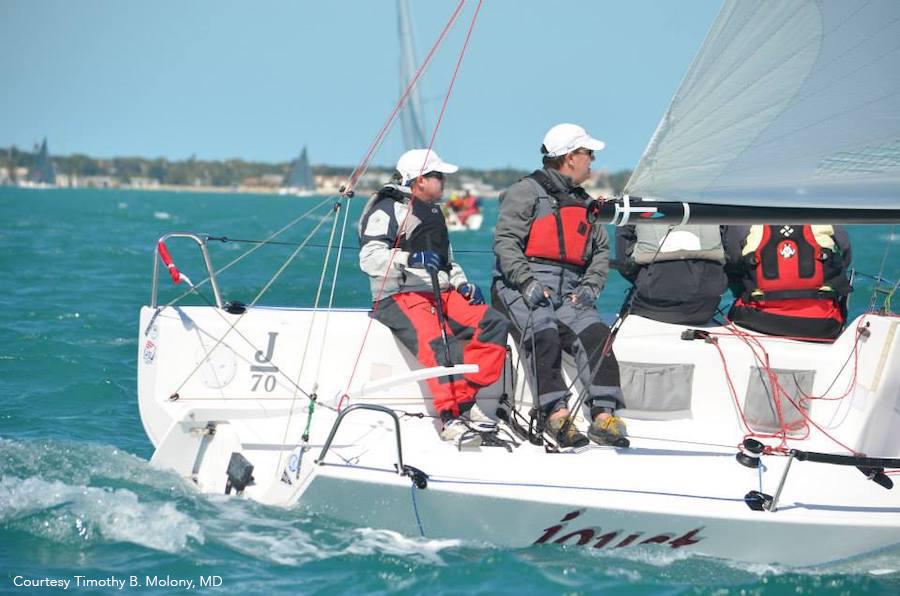
Staying aware of competitors’ positions, directions, and speed is one of the many challenges of racing, Dr. Molony notes.
Timothy B. Molony, MD, is a New Orleans-based otolaryngologist and subspecialist in neurotology at Ochsner Medical Center who regularly appears on lists of top doctors in the Big Easy. He also happens to be a competitive yachtsman who has participated in professional racing events throughout the United States, Mexico, the Caribbean, and England.
Explore This Issue
July 2023Why yachting? The sport is tied to Dr. Molony’s family history and to his geographical home base. “There’s a very long tradition in the South of sailing and racing, and I grew up in that whole atmosphere,” he said. “My grandfather was a yachtsman, and my father was a competitive sailor who taught us all how to sail.”
In general, sailing is a very intellectual sport. Yes, it requires some physicality, but it’s a sport for thinkers. You must be able to read the wind and the water. It’s almost like a chess game. It rewards thinking and tactical knowledge and experience. —Timothy B. Molony, MD
From a young age, the future surgeon found that competitive sailing was the perfect fit. “I don’t like to fish and I’m not much of a hunter—I never really liked to go out and kill things. I don’t have the hand–eye coordination for golf and I’m not a very big person, so I wasn’t cut out for contact sports,” Dr. Molony explained. As a student, he joined the University of Virginia sailing team and continued to sail throughout his otolaryngology residency in Florida and his fellowship in Southern California.
Today, Dr. Molony serves as vice commodore of the 175-year-old Southern Yacht Club situated on Lake Pontchartrain on the north side of New Orleans. At age 66, he continues to race competitively, usually as skipper on one of his own boats, with his son Henry at his side, though occasionally on friends’ teams. He also continues to practice at Ochsner Medical Center, where he has been on staff since 1987, specializing in treating patients with ear- and hearing-related conditions. Over the years, Dr. Molony’s appreciation for both practicing medicine and racing yachts has not waned a bit, as he discussed in a recent conversation with ENTtoday.
Q: How does one become a leading physician in a specialized field while maintaining an interest as consuming as yacht racing?
A: It’s just a matter of how badly you want to do it and then making time. I participated in a regional competition while I was a junior medical school student in 1978. During residency in Tampa, Fla., I participated in the Southern Ocean racing circuit, which is one of the biggest events in yacht racing. Then in Los Angeles, I was able to break out of the clinic on Wednesday afternoons. Wherever I was, whether going to school or training, I managed to carry on with sailing on the weekend. Even after starting a family, I always made time to sail and race, even at a high, semi-professional level.
Q: What do you love about yacht racing?
A: In general, sailing is a very intellectual sport. Yes, it requires some physicality, but it’s a sport for thinkers. You must be able to read the wind and the water. It’s almost like a chess game. It rewards thinking and tactical knowledge and experience. That’s what I really enjoy about it. Also, it’s fun to go out there and test your wits against your fellow competitors and friends. Then after the race, you get to meet up at the bar at the Yacht Club and rehash the day’s competition. That’s really half the fun.
Q: Have there been any particularly memorable moments?
A: One of my fondest memories is from during my medical training in Los Angeles. One of my mentors, the great ear surgeon Dr. Derald Brackmann, was on vacation, so I kind of snuck out and went skiing up in the mountains, then drove over to Marina del Rey and went sailing. So, I did the skiing and sailing combo all in one day. That was the beauty of California! The highlight of my sailing career, though, was when our team had a top 10 finish out of 90 boats at the 2014 J/70 World Championship in Newport, R.I., with primarily professional teams. We trained for almost a year for that event.
Q: What type of yachts do you have and how do you name them?
A: My wife Regina doesn’t really like to sail, so to keep the peace at home, my recent boats have been named after our cats, which we both love. Lucy was our Siamese and Valerio was a jaguar that escaped from the zoo in 2017 and ate a bunch of alpacas, so that was kind of a bad joke.
